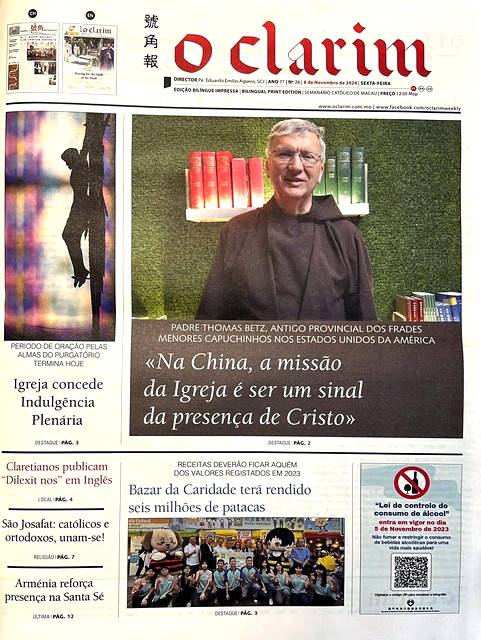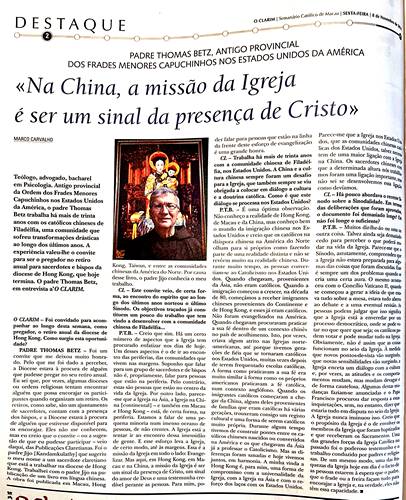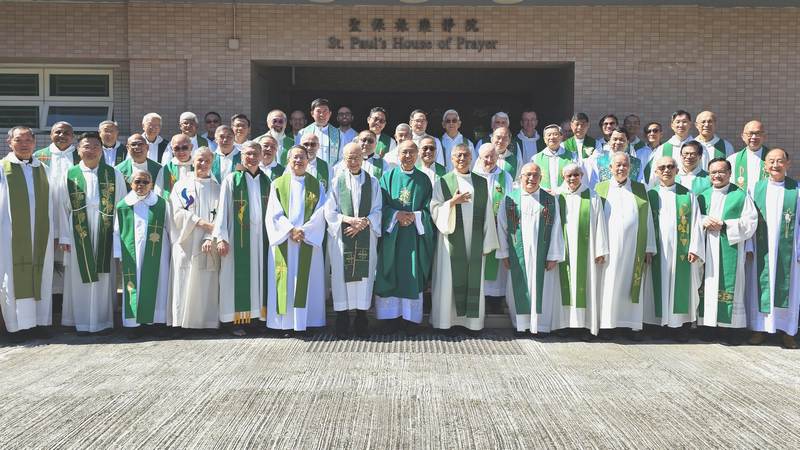FATHER THOMAS BETZ, FORMER PROVINCIAL
TO THE FRIARS MINOR CAPUCHINS IN THE UNITED STATES OF AMERICA

November 12, 2024
Theologian, lawyer, bachelor in Psychology. Former provincial of the Order of Friars Minor Capuchins in the United States of America, Father Thomas Betz has worked for more than thirty years for the Chinese Catholics of Philadelphia, a community that has undergone drastic transformations over the last two years. The experience is worth the invitation to be a preacher at the annual retreat for priests and bishops of the diocese of Hong Kong, which ends today.
Father Thomas Betz, in an interview with O CLARIM:
O CLARIM – I was invited to accompany you throughout this week as you preached the annual retreat of the diocese of Hong Kong. How did this opportunity arise?
FATHER THOMAS BETZ – It was a treat and a great honor. As I was told, the Diocese was looking for someone who could offer their annual retreat. I know that, from time to time, some dioceses or Religious orders try to find someone who can encourage the participants when organizing a retreat. The retreats, as you know, have a council of priests, with the presence of two bishops, and the Diocese is looking for someone who is available to encourage you. He did not know me, but he believed that the invitation – or the suggestion that he could participate – saw here, das Publicações Claretianas. It was Father Jijo [Kandamkulathy] who suggested my name to a Claretian priest who is working in the diocese of Hong Kong. I worked with Father Jijo in publishing a book in Chinese language. The work was published in Macau, Hong Kong, Taiwan, and among the Chinese communities in North America. Because of this book, Father Jijo knew my work.
CL – This invitation took place, in a certain way, to find the spirit that occurred over the last two years or the last Synod. The objectives outlined are part of the work that I have to do with the Chinese community of Philadelphia…

CL – I have worked for more than thirty years with the Chinese community in Philadelphia, in the United States. China and Chinese culture have always been a challenge for the Church, which has also always been forced to place Catholic culture and doctrine in dialogue. How is this dialogue being processed in the United States?
P.T.B. – It is an optimal observation. I do not know the reality of Hong Kong, Macau and China, but I know the world of Chinese immigration to the United States and I believe that Catholics in the Chinese diaspora in North America feel for themselves that they are part of a different and not a different reality. It is widely seen in Chinese reality. For a long time, people converted to Catholicism in the United States. When we came from Asia, we were not Catholics. When immigration began to grow, in the 80s, we began to receive Chinese immigrants from the Mainland and Hong Kong, and they were no longer Catholics. We are not evangelized in America. When we try to practice our faith within a Chinese context in the country of residence. This, at times, created some supporters in North American Churches, because we have had generations of believers who became Catholic in the United States, many times after attending Catholic schools. The way they practice their faith was very similar to the way Americans themselves practice their Catholic faith, in an English-speaking context. When Catholic immigrants come to China, some of them coming from families that were Catholics have been living for several years, they have a cultural record and a form of being Catholic that is very much their own. For some time we have been building bridges between the Chinese Catholics born or converted in America and those who came from Asia. But as differences are healed and today we live together, in harmony. A visit to Hong Kong is, for me, a form of commitment to the universality of the Church, to the Church in Asia and to strengthening ties with the United States. It seems to me that the Church in the United States, that the Chinese Catholic communities in the United States, perhaps need a greater connection with the Church in China. We Chinese priests know that at a certain point we work for an important link, but we do not develop that link as we intended.
CL – The recent Synod on Synodality has recently been addressed. In terms of deliberations that were approved, or was the document too long? Wasn't it long or enough?
 P.T.B. – Many will tell you either one thing or another. Perhaps he is still too yielding to realize what could change the life of the Church. It seems to me that the Synod, astutely, understood that the Church was not prepared for some of the things that were discussed. That is always a problem when a certain aura is created. The same thing happened like the Second Vatican Council, when the idea began to be generated that everything was on the table, everything was open to debate and an eventual review. As people we can judge that this means that the Church is subject to a democratic process, where you can vote no matter what you want; Catholics can vote and can move everything in the Church. Obviously, it is not the case that things work in the Church. As new points of view emerge, new sensitivities emerge, the Church envisions a dialogue with culture and, at times, attitudes and behaviors change, but wander and cautiously. Some of these changes were announced and Pope Francis tried to respond to these concerns, but, nevertheless, it would be said that everything would be in dispute in the Church. A Igreja never insinuou this. He believed that the purpose of the Church was to involve the members of the Church who were baptized and who received the Sacraments. One of the greatest strengths of the Catholic Church was the powerful testimonies and work led by priests and nuns. In the same way, one of the weaknesses of the Church today is the fact that people will be waiting for the priest, the friar or the Religious to do everything to encourage the Church and, in truth, they do not have that capacity.
P.T.B. – Many will tell you either one thing or another. Perhaps he is still too yielding to realize what could change the life of the Church. It seems to me that the Synod, astutely, understood that the Church was not prepared for some of the things that were discussed. That is always a problem when a certain aura is created. The same thing happened like the Second Vatican Council, when the idea began to be generated that everything was on the table, everything was open to debate and an eventual review. As people we can judge that this means that the Church is subject to a democratic process, where you can vote no matter what you want; Catholics can vote and can move everything in the Church. Obviously, it is not the case that things work in the Church. As new points of view emerge, new sensitivities emerge, the Church envisions a dialogue with culture and, at times, attitudes and behaviors change, but wander and cautiously. Some of these changes were announced and Pope Francis tried to respond to these concerns, but, nevertheless, it would be said that everything would be in dispute in the Church. A Igreja never insinuou this. He believed that the purpose of the Church was to involve the members of the Church who were baptized and who received the Sacraments. One of the greatest strengths of the Catholic Church was the powerful testimonies and work led by priests and nuns. In the same way, one of the weaknesses of the Church today is the fact that people will be waiting for the priest, the friar or the Religious to do everything to encourage the Church and, in truth, they do not have that capacity.
